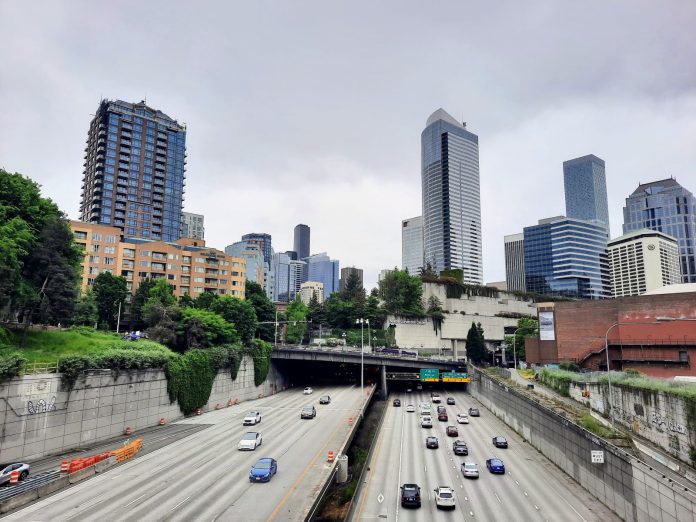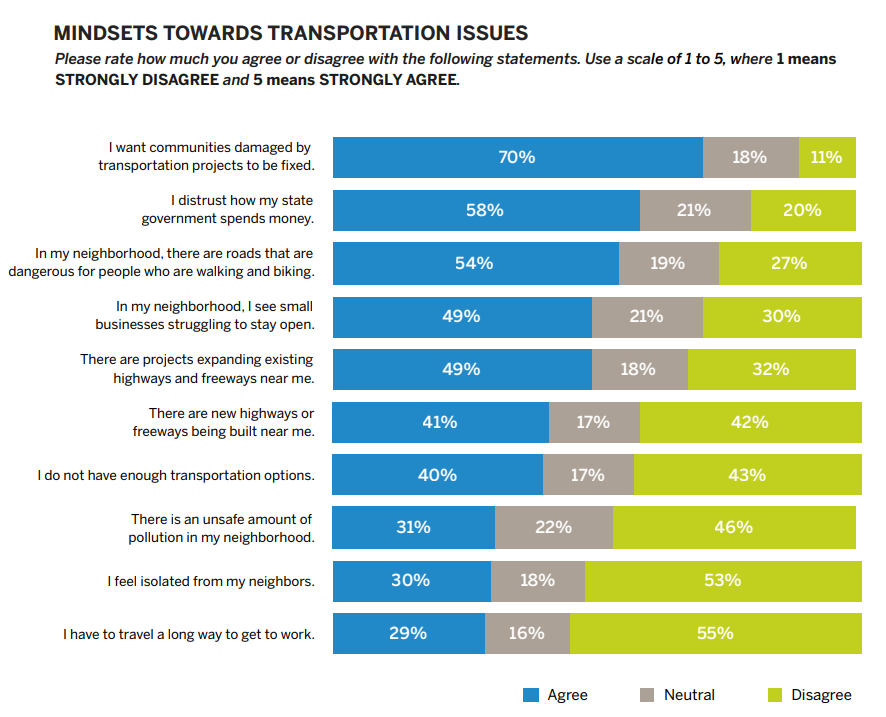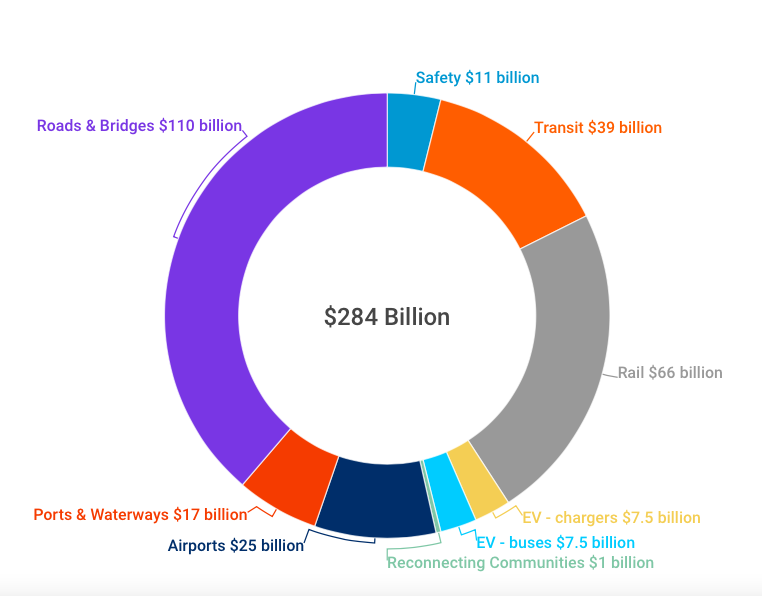
A new poll found 82% of voters don’t believe highway expansions are the best solution for reducing congestion.
America runs on highway sprawl and car commercials, but ample reason exists to think most Americans are seeking a different way to tackle transportation and growth issues. A new national poll conducted by Hattaway Communications found overwhelming support for increasing investment in trains, buses, bike lanes, and sidewalks and shifting away from the strategy of focusing resources on highway expansion, which most states deploy.
The results upend the status quo in transportation spending, as a press release from advocacy groups, America Walks, Transportation for America, and the Natural Resources Defense Council (NRDC) noted.
“In 2021, The Washington Post estimated that highway widening and expansion consumed more than a third of states’ capital spending on roads (over $19 billion). These projects were backed by promises to reduce congestion. The public isn’t buying it,” the release said. “The results of a national survey of 2,001 registered U.S. voters — 90% of whom own a car they drive regularly — underscores a widely shared belief that highway expansion doesn’t work as a short- or long-term strategy for reducing traffic and that we should invest more in other options.”
Washington State led the pack in that analysis, spending 76% of its transportation spending on highway expansion rather than maintenance, transit, and safe streets. The 2022 Move Ahead Washington began to shift priorities with more transit investment, but only marginally, with highway expansion still taking the lion’s share. Those investments led by $1 billion for widening I-5 in Vancouver misleadingly branded as a simple interstate bridge replacement by Washington and Oregon’s DOTs. The full project cost will likely exceed $7 billion.
In their statements, the three groups underscored how public opinion has turned against highway expansion, after decades of never-ending expansion that largely failed to solve congestion or improve quality of life over the long-term. People think differently than the departments of transportation (DOTs) tasked with meeting their needs. They flagged the following data points from the poll:
- 70% of respondents agree that “providing people with more transportation options is better for our health, safety, and economy than building more highways.”
- 67% of respondents agreed that “expanding highway stakes years, causes delays, and costs billions of dollars.” The same percentage believes that “widening highways attracts more people to drive, which creates more traffic in the long run.” Only 11% felt state DOTs actually deliver congestion relief with highway expansions. In other words, the public understands the concept of “induced demand,” which is widely ignored by state legislatures, DOTs, Congress, and federal agencies.
- 69% of respondents agree that “it’s more important to protect our quality of life than to spend billions of tax dollars on expanding highways. By removing a few miles of highway and adding more transportation options, like trains, buses, bike lanes, and sidewalks, we can have healthier communities.”
- 71% of respondents agree that “no matter where you live, you should have the freedom to easily get where you need to go. Almost all government spending on transportation goes to highways. Instead, states should fund more options, like trains, buses, bike lanes, and sidewalks.”
Former Seattle Mayor Mike McGinn made an appearance in the press release. He is now executive director of national pedestrian advocacy group America Walks, but he cut his teeth fighting highway expansion projects like the four-billion-dollar SR 99 tunnel in downtown Seattle.

“Our country remains on a highway spending spree while requests for basic investments in walkability and transit are given low priority,” McGinn said. “I hope this survey serves as a wake-up call to politicians that the public is clamoring for reasonable investments in our health, climate, and quality of life, not traffic-inducing polluting highways.”

Transportation for America saw support for their maintenance first approach to highways and prioritization of transit and safety investments in poll results.
“We’re repeatedly told by leaders on Capitol Hill that requiring states to prioritize maintenance first is just too controversial,” said Beth Osborne, director of Transportation for America. “But this survey shows yet again that there’s no controversy among the people they serve — they’re beyond ready to retire the last generation’s playbook when it comes to improving mobility and getting them where they need to go.”
The NDRC tied misguided transportation priorities to environmental justice issues. As highways were being built, DOTs focused major projects and the associated pollution on communities of color and low-income neighborhoods — such as South Park in Seattle’s case.
“These results are clear: Americans are eager to see the transportation investments that can connect and repair their communities,” said Rabi Abonour, a transportation advocate at NRDC. “Federal, state, and local leaders should follow the lead of the public and invest in the public transit and related projects that will really improve mobility, clean the air, and address climate pollution.”

President Biden’s Infrastructure and Jobs Act passed in 2021 did include a “Reconnecting Communities” program that funds work to remove or mitigate highways from communities where they’ve caused harm. However, that program received only a tiny fraction of overall spending: $1 billion out of a $1.2 trillion package.
“Despite a lot of earlier hype, the Reconnecting Communities Act, which aims to undo damage inflicted on urban neighborhoods in the early days of highway construction, received only $1 billion funding, a significant downgrade from the $20 billion initially promised earlier this year,” The Urbanist’s Natalie Bicknell Argerious reported in 2021.
The poll adds support to the idea that investments should go toward transit and programs like the Reconnecting Communities Act and that DOTs and the leaders governing them are behind the times.
The survey was commissioned by Smart Growth America and fielded online between February 23 and March 7, 2023. Pollsters note it reflects the demographic and geographic composition of the United States. See the full survey results for more.
Doug Trumm is publisher of The Urbanist. An Urbanist writer since 2015, he dreams of pedestrian streets, bus lanes, and a mass-timber building spree to end our housing crisis. He graduated from the Evans School of Public Policy and Governance at the University of Washington in 2019. He lives in Seattle's Fremont neighborhood and loves to explore the city by foot and by bike.

